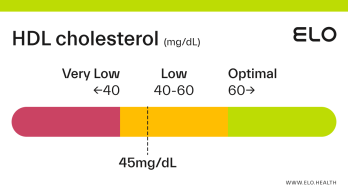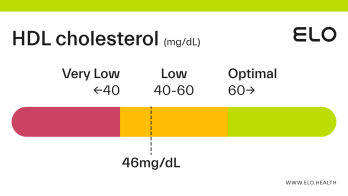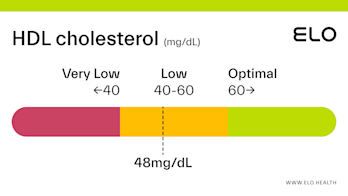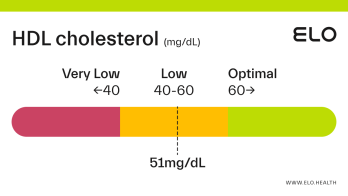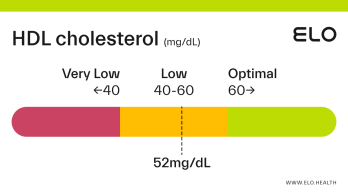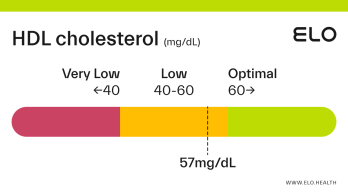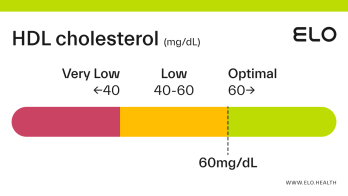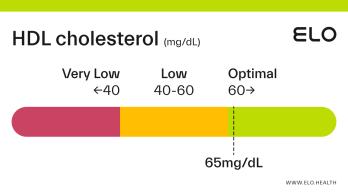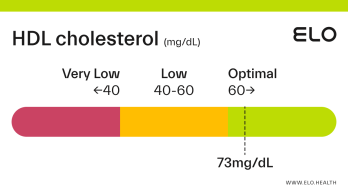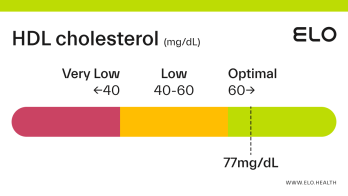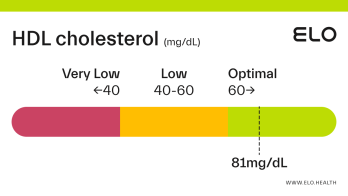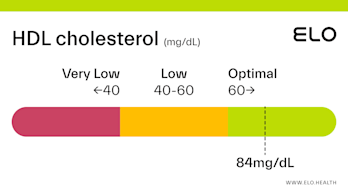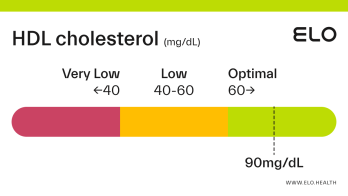HDL Cholesterol: 70 mg/dL
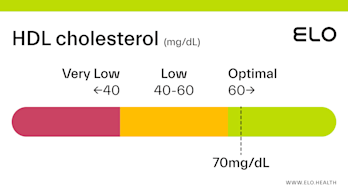
What does an HDL level of 70 mean?
An HDL cholesterol level of 70 mg/dL is considered optimal. HDL levels in the 60-100 mg/dL range are associated with a lower risk of heart disease, so the higher, the better.
Factors that could contribute to an HDL level of 70
A variety of factors can affect HDL levels, including your diet, weight, and physical activity level. Your age, sex, race, and genetics also impact HDL levels.
Diet: Diets that are high fiber and low in added sugars and unhealthy fats promote higher HDL levels.
Weight. Being at a healthy weight promotes higher HDL levels.
Physical Activity. Exercising regularly can increase HDL cholesterol levels and lower LDL levels.
Age and Sex: Women tend to have higher HDL levels than men, though levels tend to decrease after menopause.
Genetics (heredity): Genetics play a role in cholesterol production, which is why family members commonly have similar cholesterol levels.
Race. Blacks/African Americans are more likely to have higher HDL levels; however, other risk factors, such as high blood pressure, obesity, or diabetes, may outweigh the health benefit of these higher levels [8].
Alcohol: Some evidence suggests moderate alcohol consumption may increase HDL levels [6]. For healthy adults, that’s no more than one drink a day for women of all ages and men older than age 65, and two drinks a day for men aged 65 and younger [6].
How to maintain optimal HDL levels
An HDL level of 70 mg/dL is good for your overall health. If your LDL (bad) cholesterol and triglyceride levels are in the normal range, having an HDL level of 70 mg/dL also puts you at lower risk for developing heart disease in the future.
Because “bad” cholesterol levels tend to increase with age, it’s best to put heart-healthy habits into place now. Here are some things you can do to help keep your “good” HDL cholesterol levels in the optimal range:
Get 30-60 minutes of moderate physical activity most days of the week.
Fill up on fiber, particularly from beans and whole grains. Gradually increase your fiber intake to 30-40 g/day if you’re currently consuming less.
Avoid trans fats (like hydrogenated oils) and limit your saturated fat intake to < 10% of total calories.
Eat small, fatty fish, including salmon, sardines, and mackerel, at least twice a week.
Lose excess weight if you are overweight or obese.
Quit smoking if you currently smoke.
Manage stress and get adequate sleep as stress promotes inflammation that can lower HDL levels.
References
Cholesterol Levels: What You Need to Know. (n.d.). U.S. National Library of Medicine | NIH. Retrieved September 9, 2021, from
https://medlineplus.gov/cholesterollevelswhatyouneedtoknow.html
Carotid Artery Disease. (n.d.). National Heart, Lung, and Blood Institute | NIH. Retrieved September 9, 2021, from
https://www.nhlbi.nih.gov/health-topics/carotid-artery-disease
High cholesterol. (n.d.). NHS Inform. Retrieved September 9, 2021, from
https://www.nhsinform.scot/illnesses-and-conditions/blood-and-lymph/high-cholesterol
Racette, S. B., Lin, X., Lefevre, M., Spearie, C. A., Most, M. M., Ma, L., & Ostlund, R. E., Jr (2010). Dose effects of dietary phytosterols on cholesterol metabolism: a controlled feeding study. The American journal of clinical nutrition, 91(1), 32–38.
https://doi.org/10.3945/ajcn.2009.28070
Cholesterol: Types, Tests, Treatments, Prevention. (2020, July 31). Cleveland Clinic.
https://my.clevelandclinic.org/health/articles/11920-cholesterol-numbers-what-do-they-mean
HDL cholesterol: How to boost your “good” cholesterol. (2020, November 10). Mayo Clinic.
https://www.mayoclinic.org/diseases-conditions/high-blood-cholesterol/in-depth/hdl-cholesterol/art-20046388
HDL: The “Good” Cholesterol. (2019, April 18). National Institutes of Health.
https://medlineplus.gov/hdlthegoodcholesterol.html
Blood Cholesterol | NHLBI, NIH. (2021, January 4). National Institutes of Health.
https://www.nhlbi.nih.gov/health-topics/blood-cholesterol

